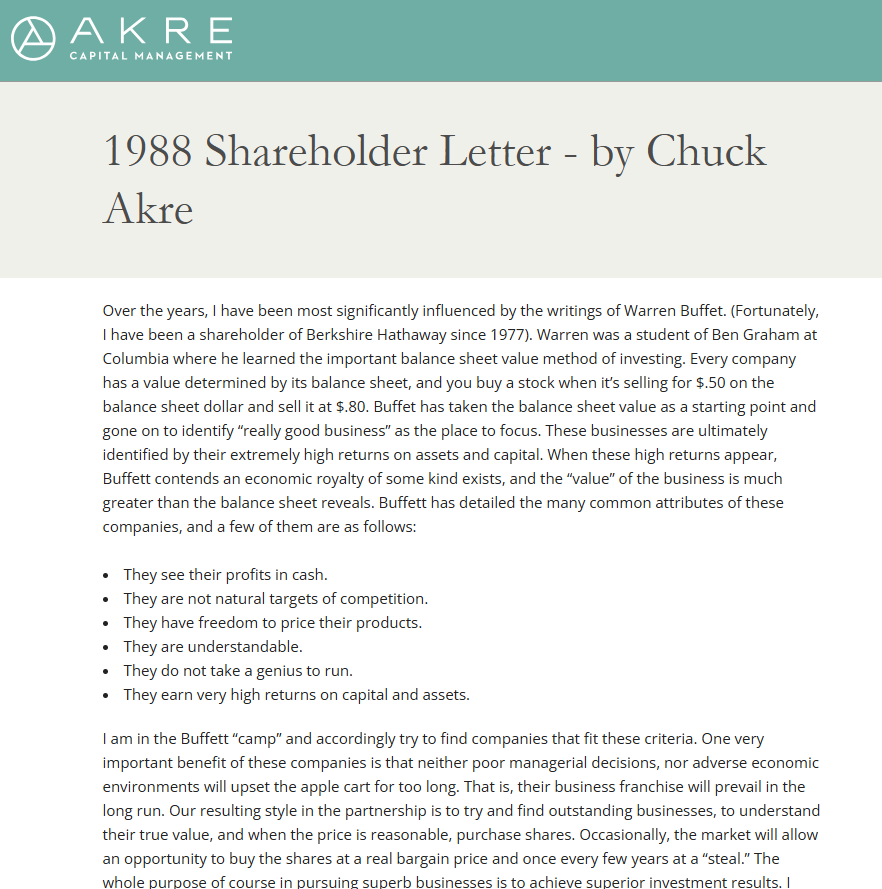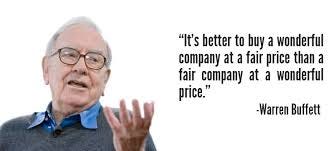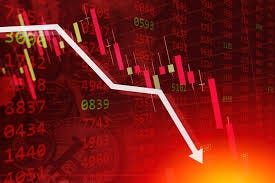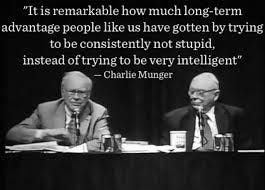How Chuck Akre Finds and Invests in Wonderful Businesses
Learning from Buffett and the birth of the 3-legged stool
Welcome to issue #003 of Invested Capital. Each week, I share one letter to help you invest smarter, think long-term, and build lasting wealth. My goal? To cut through the noise and bring you timeless lessons from great investors so you can make better decisions with your money and your life. Join 300+ readers learning how to compound capital and wisdom, one issue at a time.
In this week’s issue, I’m sharing my highlights from Chuck Akre’s 1988 Shareholder Letter.
Focus on businesses with high returns on capital
"Buffett has taken the balance sheet value as a starting point and gone to identify ‘really good business’ as the place to focus. These businesses are ultimately identified by their extremely high returns on assets and capital. When these high returns appear, Buffett contends an economic royalty of some kind exists, and the “value” of the business is much greater than the balance sheet reveals.” -Chuck Akre
When I read this, I immediately thought of Charlie Munger. Here’s what Charlie had to say on the importance of high returns on capital:
“Over the long term, it is hard for a stock to earn a much better return than the business, which underlies it earnings. If the business earns 6% on capital over 40 years and you hold it for 40 years, you are not going to make much different than a 6 percent return—even if you originally buy it at a huge discount. Conversely, if a business earns 18% on capital over 20 or 30 years, even if you pay an expensive looking price, you end up with one hell of a result.”
A consistently high ROC requires 3 elements:
Durability
Long runway of reinvestment opportunities
Pricing power
While a high return on capital is great, what matters next is the growth of that ROC.
There are 4 scenarios a business could have:
High ROC and low growth (Quality)
High ROC and high growth (Quality Growth)
Low ROC and low growth (Cigar-Butts)
Low ROC and High growth (Growth)
What you want is a business that has a high ROC and high capital growth.
Buy a great business at a fair price
"Our resulting style in the partnership is to try and find outstanding businesses, to understand their true value, and when the price is reasonable, purchase shares.” -Chuck Akre
Most of the work is done before you buy a stock.
You identify a great business.
You understand the business inside and out, in that you can simply explain it to a 5th grader.
Now comes buying the shares.
Price matters. Don’t overpay.
Take advantage of market crashes
"Occasionally, the market will allow an opportunity to buy the shares at a real bargain price and once every few years at a “steal.”” -Chuck Akre
When there is widespread fear, there is opportunity for long-term investors to acquire wonderful businesses at Black Friday prices.
These events are rare, but they do happen.
The Dot-Com bust, the Great Financial Crisis, the Covid shock.
You won’t know when exactly they will occur, but know that they will come and that you should be ready for them.
In these rare opportunities, long term investors can create enduring wealth by buying wonderful quality businesses at cheap discounts.
Rule #1: Don’t lose money
"The practice of not losing money is significantly advanced by the selection of superior businesses, because as we just pointed out, their royalty keeps on working in spite of general business conditions and isolated poor managerial decisions.” -Chuck Akre
When the guiding principle is not to lose money, your filtering process of “great businesses” narrows.
If someone gave you their life savings to invest, you would think differently about where you would allocate that capital.
When you invest in a great business that has durability, great management, and reinvestment opportunities, your downside is well protected.
Go for durability
"One very important benefit of these companies is that neither poor managerial decisions, nor adverse economic environments will upset the apple cart for too long. That is, their business franchise will prevail in the long run.” -Chuck Akre
2 criteria for durability:
Can withstand poor capital allocation decisions by weak management
Can withstand economic turmoil and come out the other side stronger
Many investors focus on growth instead; you should focus on durability.
When you own a wonderful business that has durability, the risk of capital loss is minimized.
Time is a friend of a great business
"We try to find great companies to invest in which will do well in nearly all environments. And when we buy shares in them, we do not fuss with them because we believe that they will improve and grow in value and that as time passes, that improvement in value will be reflected in the stock price.” -Chuck Akre
All of the gains are in the long term.
When you buy ownership in a business, don’t mess with it by trading in and out of the position.
As the intrinsic value of the business improves, the stock price will follow in time.
As Munger shared with us before, “The first rule of compounding: never interrupt it unnecessarily.”
Follow the 3-legged stool approach
"In following the Buffett principles to their logical conclusion, I leave defined Nirvana in investing as finding a company with the following characteristics: 1) It is a superior business, 2) It is exceptionally well-managed, 3) The managers reinvest the naturally occurring excess capital as well as they run the business enterprise.” -Chuck Akre
Buffett originally details 6 common attributes of great businesses:
They see their profits in cash. (Focus on cash flows)
They are not natural targets of competition. (market leaders)
They have freedom to price their products. (pricing power)
They are understandable.
They do not take a genius to run. (doesn’t need a stellar ceo)
They earn very high returns on capital and assets. (high ROIC/ROA)
Akre’s 3-legged stool is a refined and simplified version of Buffett’s original attributes.
Superior businesses
Well-managed
Prudent reinvestment allocation
Make a few quality decisions a year
"The fewer investment decisions we make, the less exposure we have to making mistakes. Obviously, these decisions that are made must be correct, which is why we spend so much time trying to understand the quality of businesses.” -Chuck Akre
Your focus should be on making a few decisions a year.
In the same way as Buffett’s punch card approach, you should think very carefully and deeply about the business you want to invest in.
When you think more about the business you want to own, the fewer mistakes you make.
And the fewer mistakes you make, the less risk of capital loss.
Again, I go back to Charlie Munger. He says, “It's remarkable how much long-term advantage people like us have gotten by trying to be consistently not stupid, instead of trying to be very intelligent.”
The end result is a concentrated, low-turnover portfolio invested in high-quality businesses.
Tl;dr
Invest in businesses that have a high ROC
Buy great businesses at fair prices, price matters
Take advantage of market crashes
Follow Rule #1
Go for durability
All the gains are in the long-term
Follow the 3-Legged Stool approach
Make a few quality decisions
If you enjoyed reading this, the best compliment I could receive would be if you shared it with one person or restacked it
Thanks for reading
Happy Compounding
Matt Harbaugh
Follow me on Twitter/X
Source:










